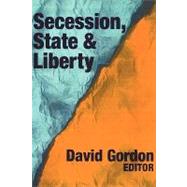Secession, State, and Liberty
, by Stove,David- ISBN: 9780765809438 | 0765809435
- Cover: Nonspecific Binding
- Copyright: 2/28/2002
The political impulse to secede -- to attempt to separate from central government control -- is a conspicuous feature of the post-cold war world. It is alive and growing in Canada, Russia, China, Italy, Belgium, Britain, and even the United States Yet secession remains one of the least studied and least understood of all historical and political phenomena. The contributors to this volume have filled this gap with wide-ranging investigations -- rooted in history, political philosophy, ethics, and economic theory -- of secessionist movements in the United States, Canada, and Europe.Is secessionism extremist, a dangerous rebellion that threatens the democratic process? Gordon and his contributors think otherwise. They believe that the secessionist impulse is a vital part of the classical liberal tradition, one that emerges when national governments become too big and too ambitious. Unlike revolution, secession seeks only separation from rule, preferably through non-violent means. It is based on the moral idea, articulated by Ludwig von Mises in 1919, that "no people and no part of a people shall be held against its will in a political association that it does not want. The authors cite the famed 1861 attempt to create a confederacy of Southern states as legal, right, and a justifiable response to Northern political imperialism. They note that this was not the first American secession attempt -- the New England states tried to form their own confederacy during the War of 1812. This evidence, they argue, begs a reinterpretation of the U.S. Constitution along secessionist lines. Further they believe that the threat of secession should be revived as a bulwark against government encroachmenton individual liberty and private property rights, a guarantor of international free trade, and a protection against attempts to curb the freedom of association.These straightforward, pellucid arguments include essays by







